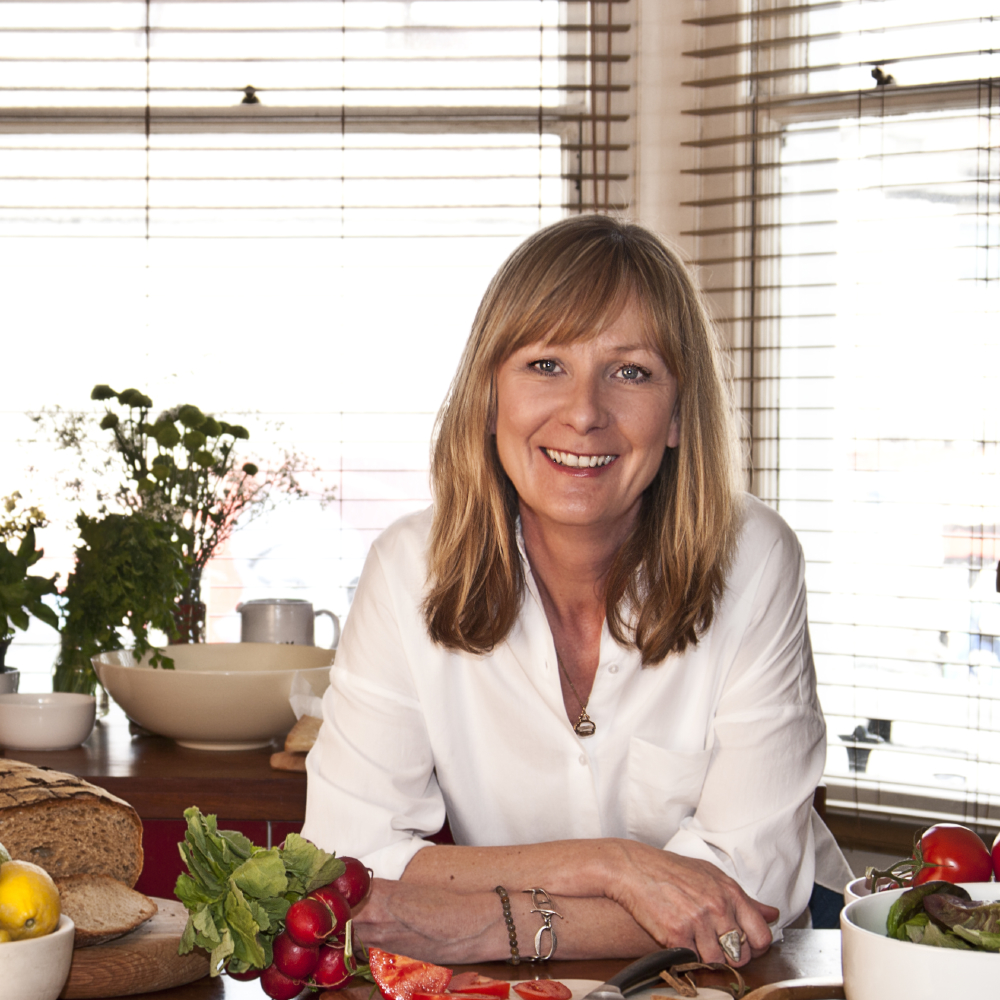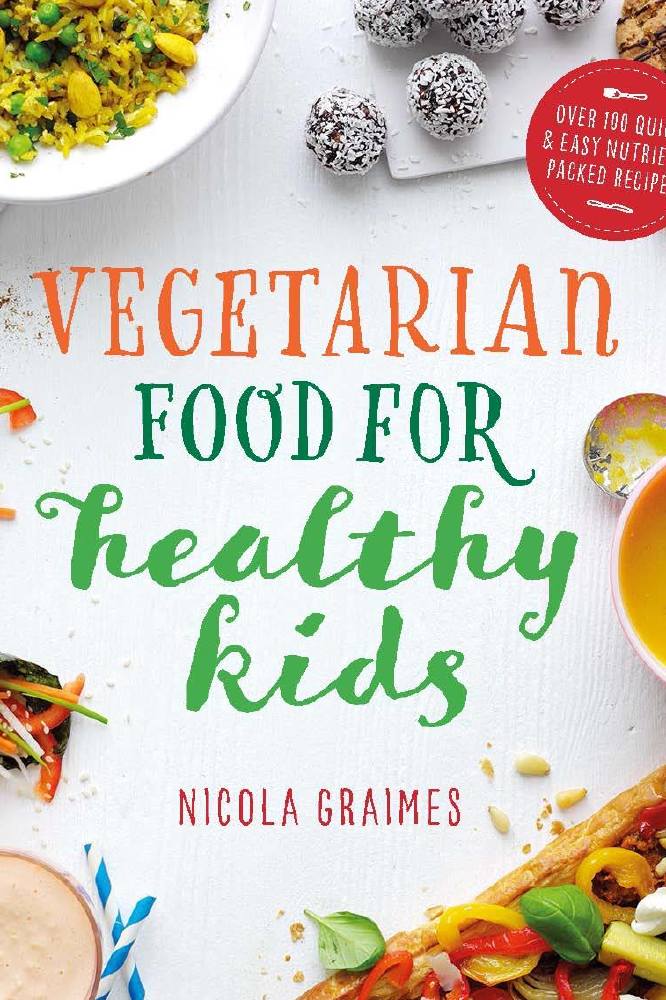Please tell us about your new book Vegetarian Foods for Healthy Kids.

Nicola Graimes
Thanks for giving me the opportunity to talk about my new book. It's a cookbook with over 100 healthy vegetarian recipes for breakfasts, snacks, lunches, weekday and weekend meals and puddings that have been created to appeal to kids but will hopefully be enjoyed by the whole family. Along with the recipes, I've added lots of practical tips and nutritional advice, make-ahead ideas as well as special Kids Cook features that encourage children to try their hand in the kitchen.
What attracts children to try new food?
It's so easy to get stuck in a rut when cooking for children and stick to familiar meals but it's a good idea to introduce your kids to new ingredients and dishes, and to open their minds to new taste experiences and flavours, after all eating is one of life's pleasures!
Yet, I'm also a realist… research shows that pizza, pasta, burgers and sausages remain all-time favourites with children, vegetarian or not, so in my book I've been mindful to include these favourite dishes but with a healthy twist, so there's pizza with a cauliflower crust, quesadillas with a sweet potato filling and a burger made from quinoa and halloumi.
Why is there so much speculation that plant based eating isn't good for children?
Many studies have highlighted the numerous positive health benefits of a vegetarian diet, so I'm not sure where this speculation comes from. I would say, however, that cutting out meat is only part of the picture… a veggie diet (as with any diet) is only healthy if it is varied and balanced, featuring a good range of ingredients. A diet of processed veggie burgers or pizza, fizzy drinks and sweets may be meat-free, but it's also low in nutritional value.
Why is it important for parents to know what each food they are giving their child is doing to their body?
A vegetarian diet can provide all the nutrients your child needs, but it pays to be aware that iron, omega-3 fatty acids and vitamin B12 are not as richly available in a meat-free diet, so I have listed veggie foods that are particularly rich in these nutrients in the book.
In each recipe, I have highlighted a key ingredient, explaining its nutritional value and how it benefits our health. That said, eating well is not just about individual foods - variety is important nutritionally to ensure that your child gets a good range of nutrients over a weekly basis; children are no different from adults in that respect.
Why do some parents struggle to get kids to eat their veggies?
I don't think it's true to say that 'some' parents struggle to get their kids to eat their veggies, I've found it's pretty much 'all' to some degree, or at some or another - but it's strangely reassuring to find that you're not alone!
There are no easy answers but one technique that worked for me is to get my kids involved in cooking and even growing veggies. A while back, my son and I planted a few rocket seeds in a pot. Just seeing the leaves grow, watering them and eventually picking them was enough to encourage him to eat rocket - and he's carried on eating them and other salad leaves ever since. In fact, it was quite a breakthrough moment as previously he'd turned his nose up to quite a few vegetables.
I'm not saying we've completely cracked it or it's the only solution, but the reason I give it as an example is that it's a much more positive approach than creating tension and negativity at mealtimes if your child won't eat up their greens. Feeding by force is never the answer but neither is giving up and pandering to likes and dislikes. It's said that a child has to try a disliked food ten times before sometimes changing their mind, so persistence is key as is being inventive, creative and trying new ways to cook and prepare vegetables - there are lots of ideas in my book!
Why should parents encourage children to cook along with them?
I'm a great believer in getting children involved in cooking at home, especially as cookery classes at school are becoming more of a rarity. Learning to cook is such an important life skill and can be an enjoyable way to help children be more health aware and enjoy food - it's also a great bonding activity. I read a health report recently that confirms this. It found that children who help in the kitchen and who have a basic knowledge of healthy foods are more likely to be on the right path to eating healthily as adults as well as having a greater willingness to try different things.
There's a collection of recipes in the book called 'Kids Cook' for children to make with, or without, the help of an adult, depending on their age and ability - this is a really important part of the book for me as I wanted the book to appeal to both children and adults.
You are the former editor of Vegetarian Living Magazine so what was your highlight from working there?
I loved working on Vegetarian Living - working on magazines is very different but equally as rewarding as book publishing. One of the highlights for me was interviewing the late Linda McCartney, who was just lovely, incredibly passionate about vegetarianism, friendly and approachable. I bumped into her a few months after the interview at a restaurant launch and she instantly remembered me, inviting me to sit next to her - there was no celebrity stuffiness.
You have written many books on vegetarian food now, so what is your process when putting one together?
I have around thirty books to my name and many are vegetarian, all are health related but do differ in their subject matter, so Veggienomics is all about thrifty cooking on a budget, New Vegetarian Kitchen covers the best ways and cooking methods to make the most of vegetarian ingredients and Part-time Vegetarian is for flexitarians and shows how to adapt veggie meals to include meat and fish for non-vegetarians.
I'm constantly thinking about, and on the look out for, new recipe ideas and I like to write them in a notebook. When I'm working on a recipe list for a new book it's not just a compendium of my favourite recipes, I like to include a good balance of dishes, so I include some dishes that are quick and easy to make, a few that take a bit more time and effort or that feature, perhaps, slightly more unusual ingredients. I also like to keep an eye on food trends and new ingredients.
What is next for you?
At the moment, I'm working on a superfoods book as well as ghostwriting a book for a vegan celebrity.

Author Biog
Nicola Graimes is an award-winning health, cookery and food writer. A former editor of Vegetarian Living magazine in the UK, she has written over 30 books and is winner of the Best Vegetarian Cookbook in the UK in the World Gourmand Awards, Best Family Cookbook in the UK in the World Gourmand Awards and a finalist in Le Cordon Bleu World Media Awards in 2007. Her latest books The Part-time Vegetarian and Vegetarian Food for Healthy Kids are both published by Nourish. She lives by the sea in the UK.
Tagged in Vegetarian

